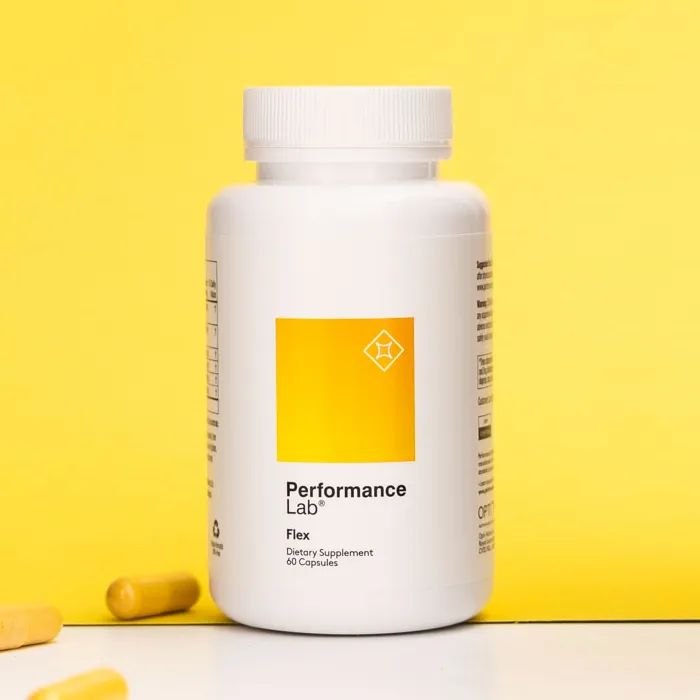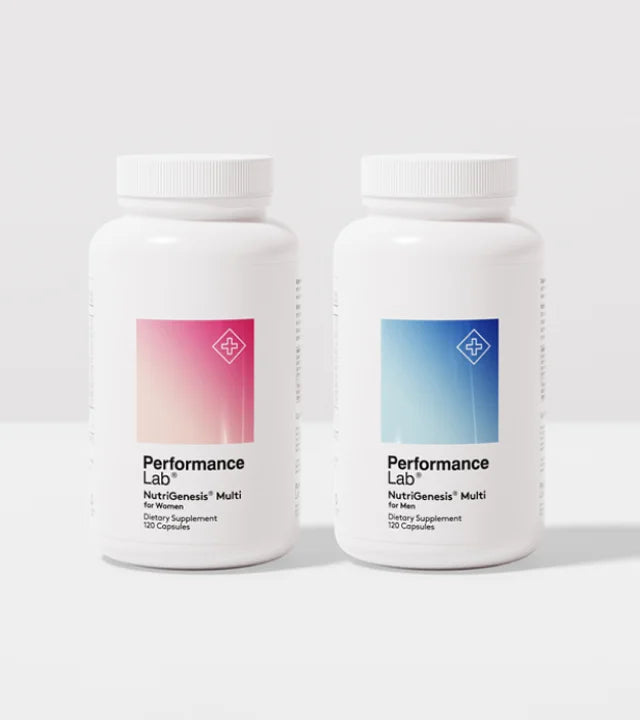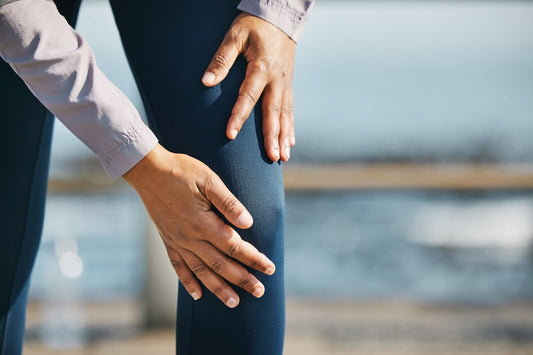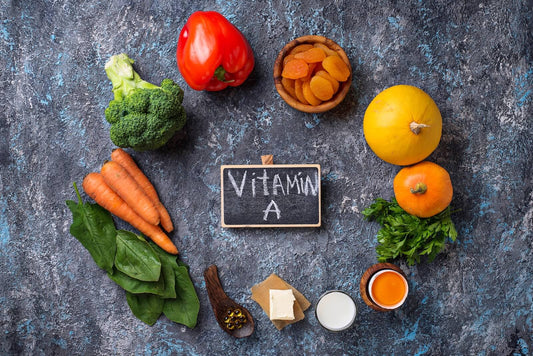Many of us will have experienced a time when our knees decided to become musical instruments - making popping and cracking sounds when we bend and straighten.
This is often harmless and a result of trapped air within the joint. Common factors contributing to knee cracking include aging, injuries, lack of physical activity, and nutritional deficiencies.
However, consistent cracking alongside pain and swelling can reduce mobility and flexibility. Not to mention the impact on your quality of life.
In this article, we explain what causes your knees to make these sounds and discuss the different ingredients in supplements that can potentially help ease joint pain and reduce cracking.
Key Takeaways
- Knee joint cracking (crepitus) is often linked to the formation of gas bubbles within the joint, but it can also be related to ligament movement, injuries, or arthritis-induced cartilage wear.
- Vitamins C, D, K, E, and B-complex play roles in collagen production (crucial for joint integrity), as well as calcium absorption and reducing joint inflammation.
- Strength training, mobility, and weight management are core strategies alongside smart supplementation.
- Curcumin, glucosamine, MSM, and chondroitin are research-backed ingredients that may help ease inflammation and support joint cartilage health.

What Causes Cracking Knees?

Cracking and popping sounds are often heard when our knee joints move, known as crepitus. There are a number of potential causes of knee crepitus:
- Gas bubbles: air can sometimes build up in the tissue surrounding the knee joint, forming small bubbles in the synovial fluid that provides joint lubrication. When the knee is bent, it causes these bubbles to burst and produces the cracking sound you hear - like a balloon bursting. Put simply, gas bubbles in the synovial fluid can burst under pressure changes, causing a popping sound.
- Ligaments: ligaments are connective tissue that surrounds the knee joint to give it support and provide stability. Sometimes these tough, elastic bands stretch slightly to pass over a bony lump when the knee is bent. When you straighten your knee again, they snap back into place and produce a clicking sound.
- Injury: injury or trauma to the knee can cause soft tissue damage and result in crepitus, pain, and swelling.
Common causes of knee damage include:
Meniscus tears: people who play sports or run a lot often experience meniscus tears. This is one of the most common knee injuries and causes crepitus, stiffness, and pain when the joint moves.
Chondromalacia patella: often due to injury or overuse, this injury is caused by damage to the cartilage which covers the kneecap, resulting in aches and pains.
Patellofemoral syndrome: also known as "runners knee". This is caused by too much pressure between the kneecap and femur which breaks down cartilage. Can be a result of overexertion or injury and leads to joint discomfort and painful crunching and grating when the knee moves.
Arthritis: rheumatoid arthritis and osteoarthritis can affect anyone at any age, but is more common in people over 50.
Wear and tear: cartilage provides essential cushioning in the knee joint to allow smooth pain-free movement. When this is broken down as a result of wear and tear, it can result in inflammation, pain, and crepitus.
Supplements for Cracking Knees
Healthy joints support physical performance and allow us to stay active and carry out our normal daily lives. Unfortunately, the factors mentioned above can cause knee and joint issues that affect our physical ability. Plus, excess weight puts additional pressure on knee joints, accelerating wear and tear.
For those of us who love to stay active and workout, knee problems are a nemesis. The good news is that there are many joint health supplements you can take to support mobile joints and soothe aches and pains.
Performance Lab Flex is a joint supplement that delivers a clever combination of nutrients and some of nature’s most researched joint-friendly botanicals, for supporting smooth movement and knee joint function.
Read on to find out more about the ingredients in Performance Lab Flex.
Targeted Ingredients for Supporting Joint Health
Curcumin - for anti-inflammatory support

Curcumin is an anti-inflammatory and antioxidant compound found in the bright yellow spice, turmeric. It can help soothe achy joints and reduce stiffness by reducing the damage caused by harmful free radicals, and by regulating the production of destructive enzymes.
Curcumin also supports the synthesis of collagen and other structural joint proteins. According to one study, curcumin is a promising supplement for helping relieve joint pain associated with arthritis. (1)
Sources: turmeric supplements, raw plant, or powder, best combined with black pepper.
Form & dosage in Flex: 250 mg of CurcuWIN® Turmeric (Curcuma longa)(root) (20% Curcuminoids).
Glucosamine sulfate - for helping cartilage nourishment

Glucosamine is an amino sugar that occurs naturally in the body. It is a building block for connective tissues that surround joints, including cartilage, tendons, ligaments, and synovial fluids. These provide cushioning and support, allowing joints to move freely.
Taking glucosamine supplements may help with the repair and regeneration of these connective tissues, lubricating joints for smoother, pain-free movements. Existing research suggests that glucosamine is effective at relieving joint stiffness and pain in people with osteoarthritis. (2)
The form of glucosamine that is most researched for supporting pain relief is sulfate. However, you'll also see other versions like glucosamine hydrochloride available on the market. A limited number of studies suggest they have similar effects, though the sulfate form is generally preferred over the other.
Sources: chicken cartilage and bone broth
Form & dosage in Flex: Glucosamine Sulfate 2KCL (from corn) 500 mg
Methylsulfonylmethane (MSM) - for the potential relief of minor joint discomfort
Organic sulfur methylsulfonylmethane (MSM) is a natural compound required for the production and maintenance of collagen, glucosamine and chondroitin, and other proteins that comprise connective tissues.
Joint pain supplements containing MSM can help in cases of the breakdown of cartilage caused by wear and tear.
Research suggests MSM can help reduce swelling, joint pain, and stiffness by reducing inflammation and protecting against damage caused by oxidative stress. (3)
Sources: a wide variety of foods, including Brussels sprouts, garlic, tea, apples, and leafy greens
Form & dosage in Flex: OptiMSM® (Methylsulfonylmethane [MSM]) 100 mg
Chondroitin Sulfate - for supporting shock absorption
Chondroitin is a vital component of cartilage. It has a strong negative charge that holds water, like a sponge, to provide important shock-absorbing properties.
Chondroitin also supports collagen production, a key building block of healthy joints, and promotes cartilage growth and repair. By taking a supplement containing chondroitin, you can help ensure your joints remain hydrated, lubricated, and healthy.
According to research, oral supplements containing chondroitin are helpful for relieving joint pain and physical function. (2)
Sources: animal cartilage
Form & dosage in Flex: Phytodroitin™ (mucopolysaccharide extract) 100 mg
Boswellia Serrata - for helping flexibility and normal joint function

Boswellia Serrata is a gum resin derived from the desert tree which produces boswellic acids that experts have found may help with joint movement, flexion, and performance of daily activities.
Compounds found in the gum have been suggested to moderate the immune response and block enzymes that break down cartilage and weaken connective tissues, potentially protecting joints from damage.
In a number of studies, Boswellia Serrata reduced pain and inflammation scores compared to a placebo. It seems to do this by modulating the body's natural inflammatory processes. Research, though still limited, suggests Boswellia taken in combination with curcumin may be synergistic for broader joint support. (4)
Sources: gum resin from the Boswellia serrata tree bark
Supplement form & dosage in Flex: AprèsFlex® Boswellia serrata (gum resin)(20% 3-O-acetyl-11-keto-ß-boswellic acid [AKBA]) 100 mg
Omega-3 Fatty Acids from Algae or Fish oil - for general joint support

Omega-3s, including eicosapentaenoic acid (EPA) and docosahexaenoic acid (DHA), are essential fatty acids that form the structure of every cell wall in the body and are vital for healthy joints.
They possess powerful anti-inflammatory properties to help reduce chronic inflammation that is commonly associated with joint problems. What's more, omega-3 fatty acids are crucial for joint lubrication and reducing stiffness.
According to research, omega-3s can help improve arthritic symptoms and may be just as effective at reducing pain as nonsteroidal anti-inflammatory drugs. (5)
Sources: sardines and other fatty fish, walnuts, flaxseeds, chia seeds, algae and fish oil supplements
Optimal dosage: experts recommend getting at least 250-500 mg of combined EPA + DHA omega-3 fatty acids per day.
Vitamins for Cracking Joints & Bone Health

A number of vitamins may play essential roles in bone and joint health. These include:
1. Vitamin C
Beyond its irreplaceable role in the immune system, vitamin C has been shown to stimulate collagen production. (9)
Collagen supports bone health and is a key structural protein of connective tissues that keeps them strong, elastic, and healthy. A reduction in collagen in connective tissues can cause severe joint pain and osteoarthritis.
Sources: a wide range of foods, including citrus fruits, dark leafy greens, and berries.
Optimal dosage: The RDA for vitamin C is 75-90 mg per day. The official tolerable upper limit (UL) is 2,000 mg per day. (10)
2. Vitamin D
Vitamin D helps your body absorb calcium, which strengthens bones. Also possesses anti-inflammatory effects to reduce joint pain. By contrast, a deficiency in this nutrient is linked to increased inflammation and weaker bones, among a host of other issues.
Sources: direct natural sunlight, fatty fish, eggs, fortified milk
Optimal dosage: While the recommended daily allowance (RDA) for vitamin D is 400-800 IU (10-20mcg) depending on your country, a large body of scientific evidence supports the use of up to 2,000 IU (50 mcg) per day as safe and effective. (7)
3. Vitamin K
Vitamin K works with calcium to strengthen bones and regulate bone mineralisation. It also works in tandem with vitamin D, which is why they are often taken together.
Sources: dark leafy greens, nato, some hard cheeses
Optimal dosage: The RDA for vitamin K is 90-120 mcg per day for women and men, respectively. (8)
4. Vitamin E
Vitamin E is a potent antioxidant that helps protect joint tissues from harmful free radicals which can also lead to inflammation.
Sources: almonds, sunflower seeds
Optimal dosage: The RDA for vitamin E is 15 mg. (11)
5. Vitamins B6, Folate, and B12
Vitamins B6, B9 (folate), and B12 help break down homocysteine, an amino acid naturally present in your blood. When there's a deficiency in any of these vitamins, homocysteine levels can rise beyond healthy levels, negatively affecting your joints as well as other bodily tissues. (15, 16)
Additionally, a deficiency in B12 can lead to fatigue, and tingling extremities, similar to symptoms of arthritis pain. Ensuring you get enough B12 can help reduce pain and reduce the production of inflammatory molecules.
Sources: eggs, fatty fish, fortified cereals, beef liver
Optimal dosage: The RDA for vitamin B6 is 1.7mg, for B9 is 400 mcg, and for B12 is 2.4mcg for most healthy adults. (12, 17, 18)
6. Additional Nutrients to Consider: Collagen and Magnesium
Beyond vitamins, various other nutritional supplements are helpful for maintaining joint health. Topping up on these can offer additional support for your cracking knees. We want to highlight two, in particular: collagen and magnesium.
Collagen supplements have been shown to help prevent cartilage breakdown and assist with the repair process for more mobile, flexible joints. (6)
Collagen sources: bone broth, chicken, beef, fish.
Optimal dosage: 40 mg of undenatured type-II collagen or 10 grams of collagen peptides. (13, 14)
Meanwhile, magnesium is shown to support bone density, modulate inflammation, and support cartilage repair - all of which may have a positive knock-on effect on how your knees feel.
Magnesium sources: spinach, dark chocolate, avocado.
Optimal dosage: The RDA for magnesium is 420 mg for most healthy adults. (19, 20)
It can get overwhelming tracking all the important vitamins and minerals you need for your joints. A more efficient way to support optimal intake is by taking a high-quality multivitamin formula such as Performance Lab® NutriGenesis® Multi.
Performance Lab® NutriGenesis Multi
The world's most advanced multivitamin formula.
Shop Now
Conclusion
More than being a nuisance, chronic cracking can sometimes mean a deeper issue that could, over time, affect your ability to carry out everyday activities. It's something to discuss with your doctor, especially if you feel other symptoms like pain.
Don't forget about the basics, such as a balanced diet and keeping healthy weight for long-term joint mobility and protecting from joint wear.
There are also natural supplements you can take, like Performance Lab® Flex, that contain safe ingredients to help support your joints, and help you excel physically!
References
- Daily, James W., Mini Yang, and Sunmin Park. "Efficacy of turmeric extracts and curcumin for alleviating the symptoms of joint arthritis: a systematic review and meta-analysis of randomized clinical trials." Journal of medicinal food 19.8 (2016): 717-729.
- Zhu, Xiaoyue, et al. "Effectiveness and safety of glucosamine and chondroitin for the treatment of osteoarthritis: a meta-analysis of randomized controlled trials." Journal of orthopaedic surgery and research 13.1 (2018): 1-9.
- Butawan, Matthew, Rodney L. Benjamin, and Richard J. Bloomer. "Methylsulfonylmethane: applications and safety of a novel dietary supplement." Nutrients 9.3 (2017): 290.
- Haroyan, Armine, et al. "Efficacy and safety of curcumin and its combination with boswellic acid in osteoarthritis: a comparative, randomized, double-blind, placebo-controlled study." BMC complementary and alternative medicine 18.1 (2018): 1-16.
- Maroon, Joseph Charles, and Jeffrey W. Bost. "ω-3 Fatty acids (fish oil) as an anti-inflammatory: an alternative to nonsteroidal anti-inflammatory drugs for discogenic pain." Surgical neurology65.4 (2006): 326-331.
- Clark, Kristine L., et al. "24-Week study on the use of collagen hydrolysate as a dietary supplement in athletes with activity-related joint pain." Current medical research and opinion 24.5 (2008): 1485-1496.
- Pludowski, Pawel et al. “Vitamin D Supplementation: A Review of the Evidence Arguing for a Daily Dose of 2000 International Units (50 µg) of Vitamin D for Adults in the General Population.” Nutrients vol. 16,3 391. 29 Jan. 2024, doi:10.3390/nu16030391
- Office of Dietary Supplements. “Vitamin K: Fact Sheet for Health Professionals.” National Institutes of Health, U.S. Department of Health & Human Services, 29 Mar. 2021, https://ods.od.nih.gov/factsheets/VitaminK-HealthProfessional/
- DePhillipo, Nicholas N et al. “Efficacy of Vitamin C Supplementation on Collagen Synthesis and Oxidative Stress After Musculoskeletal Injuries: A Systematic Review.” Orthopaedic journal of sports medicine vol. 6,10 2325967118804544. 25 Oct. 2018, doi:10.1177/2325967118804544
- Carr, Anitra C, and Cate McCall. “The role of vitamin C in the treatment of pain: new insights.” Journal of translational medicine vol. 15,1 77. 14 Apr. 2017, doi:10.1186/s12967-017-1179-7
- Office of Dietary Supplements. “Vitamin E: Fact Sheet for Health Professionals.” National Institutes of Health, U.S. Department of Health & Human Services, Mar. 2021, https://ods.od.nih.gov/factsheets/VitaminE-HealthProfessional/
- Office of Dietary Supplements. “Vitamin B12: Fact Sheet for Health Professionals.” National Institutes of Health, U.S. Department of Health & Human Services, 2 Jul. 2025, https://ods.od.nih.gov/factsheets/VitaminB12-HealthProfessional/
- Gupta, Ashim, and Nicola Maffulli. “Undenatured type II collagen for knee osteoarthritis.” Annals of medicine vol. 57,1 (2025): 2493306. doi:10.1080/07853890.2025.2493306
- Al-Atif, Hend. “Collagen Supplements for Aging and Wrinkles: A Paradigm Shift in the Fields of Dermatology and Cosmetics.” Dermatology practical & conceptual vol. 12,1 e2022018. 1 Jan. 2022, doi:10.5826/dpc.1201a18
- Hong, Haofeng et al. “Associations of Homocysteine, Folate, and Vitamin B12 with Osteoarthritis: A Mendelian Randomization Study.” Nutrients vol. 15,7 1636. 28 Mar. 2023, doi:10.3390/nu15071636
- Cleveland Clinic. “Homocysteine.” Cleveland Clinic, 31 Jan. 2025, https://my.clevelandclinic.org/health/articles/21527-homocysteine
- Office of Dietary Supplements. “Vitamin B6: Fact Sheet for Health Professionals.” National Institutes of Health, U.S. Department of Health & Human Services, 16 June 2023, https://ods.od.nih.gov/factsheets/VitaminB6-HealthProfessional/
- Office of Dietary Supplements. “Folate: Fact Sheet for Health Professionals.” National Institutes of Health, U.S. Department of Health & Human Services, 30 Nov. 2022, https://ods.od.nih.gov/factsheets/Folate-HealthProfessional
- Li, Guoyong, et al. “The Impact of Trace Elements on Osteoarthritis.” Frontiers in Medicine, vol. 8, Article 771297, 2021, doi:10.3389/fmed.2021.771297.
- Office of Dietary Supplements. “Magnesium: Fact Sheet for Health Professionals.” National Institutes of Health, U.S. Department of Health & Human Services, 2 June 2022, https://ods.od.nih.gov/factsheets/Magnesium-HealthProfessional/















